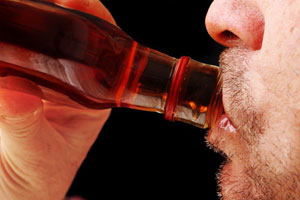
Binge drinking costs the UK £4.9 billion a year
Binge drinking is costing UK taxpayers £4.9 billion a year and policies in place to regulate alcohol sales and consumption are inadequate in mitigating the economic effects, according to the authors of a new report released today.
Research for the University of Bath’s Institute for Policy Research (IPR), compiled by academics in Bath and at the University of Essex, calculates a total cost for the effects of binge drinking by examining a range of social and economic factors, including A&E admissions, road accidents, arrests and police officers on duty.
The combined £4.9 billion total costs each person in the UK the equivalent of £77 per year.
To offset these costs, the researchers consider a combination of policy recommendations, including a 52 pence minimum unit price for alcohol and an increase in alcohol excise duty directly in line with alcohol strength. This could see a pint of beer increase by 23 pence, and a bottle of wine by 99 pence.
The authors calculate that binge drinking increases:
- The average number of daily injury-related A&E admissions by 8 per cent – equivalent to 2,504 additional daily admissions nationally;
- The daily average of road accidents by 17 per cent – equivalent to 82 additional accidents per day nationally;
- The average number of alcohol-related arrests by 45 per cent – equivalent to 786 additional arrests per day nationally;
- The number of police officers on duty by around 30 per cent – equivalent to an additional 3.2 police officers on duty at the weekend for every 10,000 people in the country.
In order to mitigate these effects and fully recover such costs, a possible policy solution would need to increase the average retail price of alcohol by at least 10 pence per unit.
Current policy suggestions for minimum unit prices range from 45 to 50 pence, however this research implies that a higher minimum unit price of 52 pence would in fact be required.
Another policy reform is on excise taxes, which requires taxes to increase directly in line with alcohol strength. But the authors suggest current proposals of 8.9 pence on 4% alcohol (i.e. beer) and 27 pence on 13% alcohol (i.e. wine) fall well below the 23 per cent increase required to offset the short-run cost of binge drinking.
Presenting his findings at the Royal Economic Society Conference in Manchester today (Tuesday 31 March), one of the researchers from the University of Bath, Dr Jonathan James, who studied for his PhD at Essex, explains: “Much is known about the effects and costs of sustained heavy drinking in relation to increased risks of chronic diseases, the damage to social relationships and the increased burden placed on public services. However, little is known about the economic and social effects of binge drinking.
“We hope this calculation of the economic costs can act as a catalyst for policy makers in the UK to take targeted action that reduces the cost of binge drinking to society.”
Collaborator, Professor Marco Francesconi Head of the Department of Economics at the University of Essex, added: “Our calculations suggest a cost of £4.9 billion per year. This is large when compared to government’s spending on some welfare programmes. For instance, it corresponds to 23 per cent of the expenditures on Housing Benefit. Furthermore, our estimate does not include costs associated with absenteeism, lost employment, reduced productivity, and long-term health problems.”
Harmful alcohol use has been identified as one of the leading preventable causes of death and key risk factors for chronic disease, such as cancer, and injuries worldwide.
Notes
Read an article about the study by Dr James and Professor Francesconi in The Conversation.
The University of Bath Institute for Policy Research has produced a policy brief.